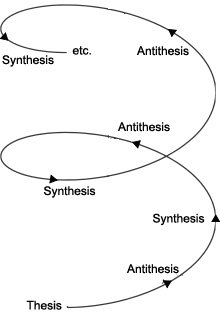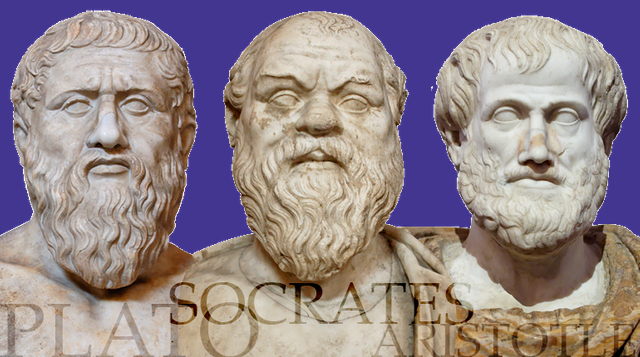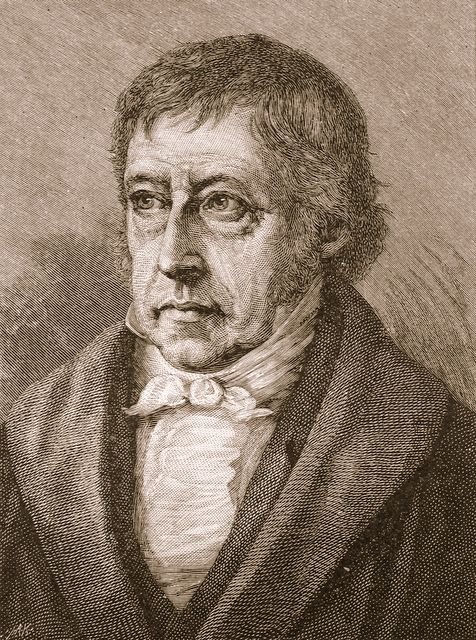Dialectics, what is it?
 Dialectics, what the hell is it?
Dialectics, what the hell is it?
Abstract
Dialectics has, historically, meant many things throughout its life, each stage furthering the concept of such and making it more and more concrete within reality. This post will serve as an introduction to every case the dialectic hath existed throughout history, and to document as such from this point in history. Note this will not go in depth to every case of such and will serve to only give a superficial, but necessary, understanding of each formation of the dialectic. With this said, there stands three major cases of the evolution of dialectics: Antiquity, Hegelian and Marxist. Each will get their own respects as much as they hath played with dialectics.
Antiquity
From antiquity, people such as Socrates, Plato and Aristotle hath used dialectics in what we now call (or they called): The Dialectical Method. This served as a means to compare two ideas in a locked competition until either one wins out, both lose or both combine to form a synthesis that hadn't been before. In the first case, the survivor of the conflict hath grown stronger because of the conflict and the other rots for they hath lost in such conflict. For the middle case is failure of both side since neither hath resolved the main issue and both remain ignorant in a way. The last case is when both equally hath resolved the conflict, that led not to annihilation of both of them, and both grow stronger because of the conflict. (Nota bene, these three cases appear again later when you get into Hegel and/or Marx. Except that both take a different twist at three cases, especially with the synthesis case.)
Now anyways, how does the Dialectical Method work? Well first you must have a mindset that things change over time (for lack of better phrasing: evolutionary thinking). Then you must accept that ideas, arguments and philosophies aren't trans-historic and cannot live in a vacuum. Or to put in another way, things that happened in a point of history can only, possibly, happen in that point of time alone and was heavily influenced by events at that time (and before it) during its conception. Finally, you must take an idea and compare it in the totality of the system and the particulars (parts) of the system as well. The main assumption throughout the entire method is that things cannot exist in isolation. (Which is a one-eighty to the Metaphysical method's assumption, or metaphysics in general, where things can exist in isolation.)
Now since the dialectic was in its beginning stage, 'tis only so useful in the confines of the past and (human) history had only started to gain traction around that time. It of course will see serious development in its later forms and be more than a method for the "struggle of ideas."
Hegelian Dialectics
Hegelian Dialectics was a major modernization and overhaul to how dialectics were used and perceived throughout the western tradition in philosophy. It retained the character of antiquity while being more useful than being relegated to pure conversations. It became more than a way of logic, it became its own theory of logic. By this time, it would be attributed in the form of the triad: Thesis, Antithesis and Synthesis. (Even though that triad is misattributed to Hegel thanks to Fichte.)
Yet Hegel never talks of Thesis-Antithesis-Synthesis model, he talks of Abstract-Negative-Concrete, Aufheben/Aufhebung and Mediation.
Abstract-Negative-Concrete (or Thesis-Antithesis-Synthesis if we are talking only in a Marxist tongue) makes it necessary for the Thesis (Abstract) to have an Antithesis (Negative), for the Thesis is flawed and the Antithesis can make it less flawed. The struggle between the two forms the Synthesis (Concrete). That of which comes at the end of the struggle, taking from the past forms as it had already existed and adding on the addition from the Antithesis.
(What ought to be noted: Is that Hegel's and Marx's Dialectics happens in the form of a Helix and not the simple triad talked about earlier. For reference look at the post's picture: it starts with a Thesis, then interacts with the Antithesis - which is not the group itself that contradicts the thesis but the force of them against the Thesis - and results in a Synthesis from the struggle, and it continues on until the end of history. Also there’s a great confusion that dialectics is a pendulum which is incredibly crass and antithetical to dialectics. Dialectics just don’t “swing side-to-side” until it finds inner peace, it is a hectic process that has no resolve as it forces everything to march forward constantly. It is the struggle of the past and the future, as it will be seen in Marx’s Dialectics as well, with the resolve coming at the end of history.)
So wait a second, what the hell is a synthesis for Hegel? Hegel would see Synthesis not only as the repository stage of the conflict but also as Aufheben/Aufhebung of it as well. For Hegel uses Aufheben/Aufhebung as abolish (superseding) throughout his works. (Remember the three cases from before?) See, for Hegel (and Marx), every conflict will resolve itself in one way or another; how they end up is another story. For there really are two cases instead of three: annihilation (unbecoming) and triumph (one gets stronger in the face of the death of another); the former case being a dead-end and the latter being what makes progress and moves history forward.
Finally Mediation, albeit this will be a short one. Everything happens for Hegel in a medium and mediation, even things that are immediate have a medium they pass through. Intuitiveness, hypocritical only in itself, also hath a medium to pass through in order to work. For every struggle between the Abstract (Thesis) and Negative (Antithesis) has a medium where they can interact with each other and struggle.
Marxist Dialectics
Finally, Marxist Dialectics. Marxist Dialectics is the most current form of Dialectics that is up to date with modern life and modern history. For if Hegel was the one to overhaul the machine, then Marx was the one to make it more compatible and concrete* with the times.
So, what did Marx brought to the table that Hegel didn't? Materialism and Science - and making dialectics fit within them and be able to make all three of them work together as to make Marx's findings realistic with the times. For Marx was a young Hegelian before he broke off with the group in the left-right split, and wanted to salvage what could be salvaged from Hegel's works. Yet a rooting-out was in order for the Absolute Idealism in Dialectics in order to work for what he had planned for in his life.
Materialism was Marx's way of salvaging Dialectics from the Absolute Idealism of Hegel and make dialectics, as aforementioned, concrete. Science on its part made all theory grounded on reality and inverses Hegel's quote on facts: "if facts contradict my theory, so much worse for the facts." This is where both materialism and science comes together to ground Dialectics in reality and form theory upon reality, not forcing reality to theory. In essence, Marx made Materialist version of the Dialectics; also known as Dialectical Materialism.
Another thing to note in this trend is that, if it wasn't heavily implied enough, Marx INVERTED** Hegel's philosophy. With such heavy inversions of Hegel in his Dialectics and the Dialectics itself, it's no surprise some aspects that surrounded Dialectics would also change. One important trend was placing that the Object were more important than the Subject in perception and consciousness; this plays a major role for both Marx's and Marxists view of consciousness (class consciousness) in relationship to society (superstructure***). Another being how groups (classes) of society look at each other (relationships), what qualifies them in society (relationship to production) and how they eventually come to a struggle that cannot exist "in peace" (revolutions). Yet, this can be saved for another time.
Concrete
All-in-all, the Dialectic hath transformed itself throughout history from Antiquity to now. Meanwhile this post didn't include the entire history of ideas in relationship to what we classify as Dialectics: like Eastern versions of Dialectics, medieval Europe's usage of Dialectics or (western) philosophers like Kant that hath certain perception of Dialectics. This is because they are left-field when in comparison to the ones that had a very serious and very important impact to the world at large (with some exceptions for the beginning case as it had an impact to the Eastern (Asian) world).
Yet, with all this said, this post serves as an introduction for the main series that I am going to conduct in Steemit, so I will refer back to this post when I have to when you have a question that was covered here. Of course, the later posts will go more in depth with the Hegelian-Marxist Dialectics and they will be fleshed out over time.
Footnotes
*Concrete: more solid and less abstract in form.
**Inverted - In this case, Marx didn't turn Hegel upside-down. That literally means he took the conclusions to prove the premises, nonetheless leaving out important contributions that Marx (and Engels) brought to Dialectics as a whole. Inversion, or turning something inside-out, is a more proper comparison between Marx and Hegel since it actually reflects the seriousness of Marx's works.
***Superstructure - being society that is built (and maintained) on the base (the means, as of private property, and mode of production in a nation) which that feeds back into the base to maintain (and build) it.
Click here to see my previous post
Sources
Phenomenology of Spirit by Hegel (Hegelian Dialectics)
Science of Logic by Hegel PDF (Hegelian Dialectics)
The entire Phenomenology of Spirit on YouTube w/ analysis by Gregory B. Sadler
Dialectic Wikipedia (except Kant's idea of such)
Dialectical-Materialism (Marxist Dialectics)



Congratulations @theironfelix! You have completed some achievement on Steemit and have been rewarded with new badge(s) :
Click on any badge to view your own Board of Honor on SteemitBoard.
For more information about SteemitBoard, click here
If you no longer want to receive notifications, reply to this comment with the word
STOPgreat post on dialectics, this is something few people here know about and fewer understand
Well, we can at least start now and help nurture this growth.